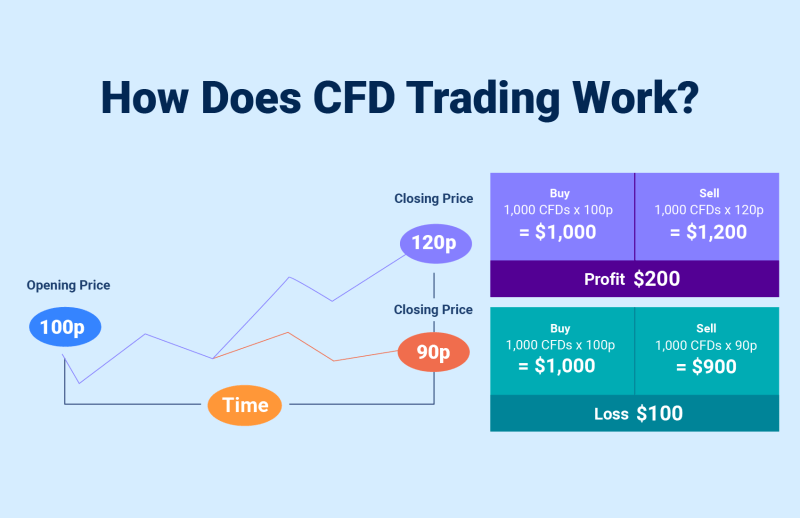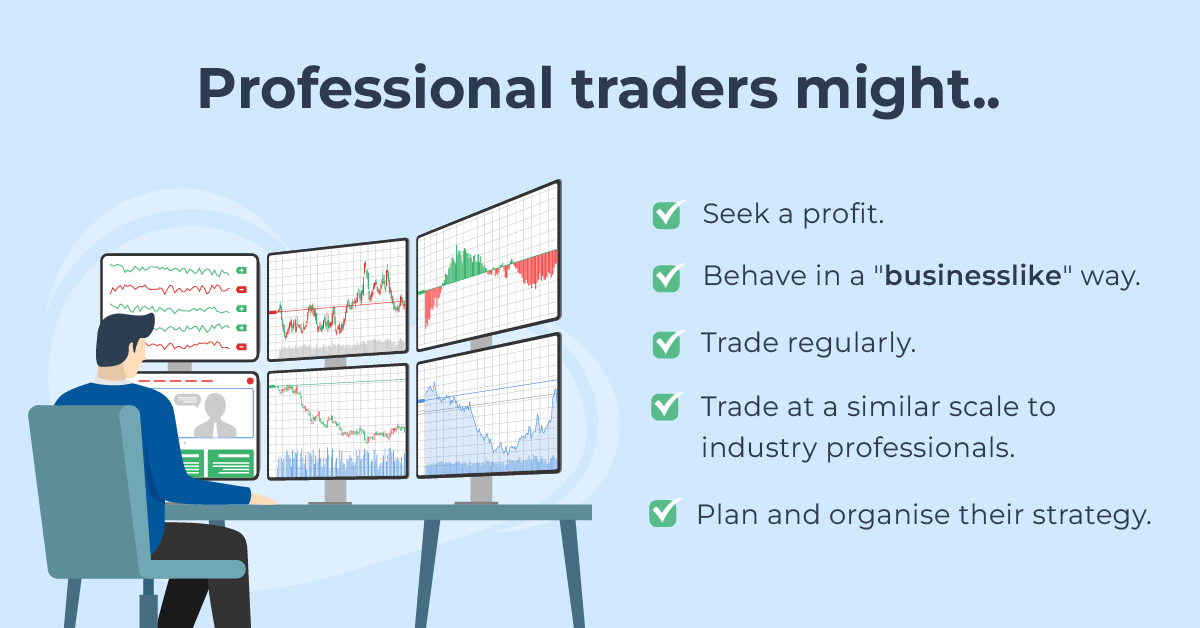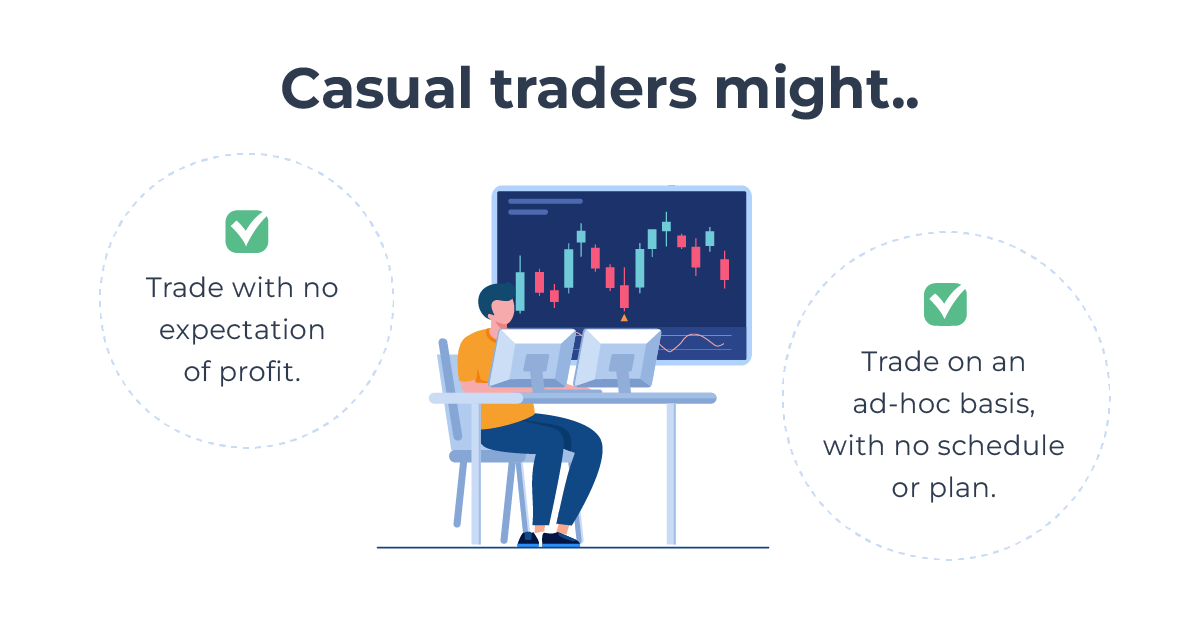Tax and CFD Trading: Accounting For Professional and Casual Traders

How does the ATO tax professional and casual CFD traders? And how are these CFD trading types defined in Australia? Find out more below.
Please note: This post is for informative purposes only and does not constitute tax or financial advice.
Many Australians trade CFDs, or contracts for difference, whether as a hobby, a side hustle, or a full-time job. As financial profits and losses will occur when trading CFDs, there are tax and accounting considerations to bear in mind.
At first glance, these considerations seem pretty clear-cut. CFD trading income is taxed in Australia, so traders will pay tax on their income and offset their losses. But the ATO’s rules on CFD trading are a little more complex, and the income of professional and casual hobby traders is treated differently.
What is CFD Trading?
A Contract for Difference (CFD) is a popular form of derivatives trading that allows investors to speculate on the price movements of various financial markets without actually owning the underlying asset. Whether it’s a forex currency pair, a commodity like gold or crude oil, a stock index, or even a cryptocurrency like Bitcoin, CFDs offer traders the flexibility to bet on both rising and falling prices.
How It Works
When trading CFDs, the investor chooses an asset and opens a position based on whether they believe its price will go up or down. This is known as:
-
Going lonchasing the asset itself, the trader enters a contract with a broker to exchange the difference in price from when the trade is opened to when it is closed. Profits or losses are determined by the magnitude g (or buying): if the trader expects the asset’s price to rise.
-
Going short (or selling): if they believe the price will decline.
Instead of purof the price movement and the direction of the position taken.
For CompareForexBrokers co-founder Justin Grossbard, it’s the flexibility of CFD trading that makes it so attractive.
“You have a lot of different choices when you trade CFDs”, Justin said.
“You can choose a range of different markets, leverage rates, and position sizes. You can target small, short-term price movements or longer-term swings. And best of all, you can potentially profit whether the market is moving up or down”.

CFD Trading Tax: Professional Traders vs. Casual Traders
From a tax perspective, the ATO treats CFD trading differently for professional and casual traders. If trading is conducted professionally, it will be taxed. If it’s undertaken as a casual hobby, it might not be taxed (but most likely will be).
Casual traders may be exempt because CFD trading can be a form of gambling in some circumstances. Comparing this to other forms of gambling, someone who places a recreational matchday bet on the AFL every couple of months might not be subject to tax. But someone who regularly studies racing form and systematically bets at horse racing meets probably would be.
Professional CFD Trading
In most cases, CFD trading is classified as a professional activity under ATO guidelines. This classification applies even to part-time or individual traders. The ATO considers several key indicators when assessing whether trading is being conducted on a professional or business basis:
-
The activity is carried out with the intent of making a profit, either in the short or long term.
-
Trading is conducted in a systematic, repeated, and organised way.
-
The trader takes steps to operate in a businesslike manner, such as:
-
Registering an ABN or business name
-
Keeping detailed records
-
Using trading strategies and risk management tools
-
The scale of operations is comparable to others in the industry.
Even if a trader does not run a registered company or trade full-time, consistent trading behaviour and profit motivation are usually sufficient for the ATO to classify the activity as professional and therefore taxable.
As most traders will be defined as professional, income from CFD trading would typically be assessed as either business income or capital gains, depending on the structure and nature of the activity. Losses may be deductible or offset, but they must be substantiated and reported accordingly.
✅ If you’re regularly trading CFDs to generate returns, regardless of scale, you should assume your activity will be taxed as professional trading under Australian tax law.

Casual/Hobby CFD Trading
While some traders may view CFD trading as a hobby or side activity, the ATO rarely classifies CFD trading as a genuine hobby for tax purposes. To fall under this category, the activity must meet very specific criteria:
-
There is no intention to make a profit.
-
Trades are not repeated regularly, and no plan or system is in place.
-
The trader does not operate in a businesslike manner, meaning there is no structured approach, no ABN registration, and no consistent market analysis or record-keeping.
Essentially, this kind of trading must be sporadic, unstructured, and motivated purely by personal curiosity or entertainment. Even minimal levels of planning or profit-seeking generally shift the activity into professional territory.
Given that most CFD traders use trading platforms, follow market movements, and seek to generate a return, even if minor, their activity is almost always considered taxable.
⚠️ Important: Just placing a small number of trades or operating part-time does not automatically make CFD trading a hobby. If there is any reasonable expectation of profit, taxation will apply.

CFD Trading as an Employee
There is another designation to consider. If CFD trading activities are conducted on behalf of someone else as part of an employment contract, the ATO might not define them as standalone professional or business activities.
For this to be the case, the employer takes all the profits and accepts all the losses on the trade. Payment to the employee is then provided in the form of wages or salary, and is subject to payroll tax.
Deciding Whether CFD Trading is Professional or Casual
From the ATO’s perspective, there is a clear distinction between professional and casual (or hobbyist) CFD trading. However, in practical terms, most CFD trading activities are considered professional and therefore taxable.
CompareForexBrokers co-founder Justin Grossbard explains:
“Even when trading with the best CFD brokers in Australia, profit is not guaranteed. However, traders are still working hard to be profitable, analysing markets and using tools to limit risk. They are trading hoping to make a profit, so their activities would usually be considered professional.”
He adds:
“It’s possible to meet the ‘casual hobby’ criteria, but it’s not common to see trading like that.”
This is an important distinction to make. For CFD trading to be classified as a non-taxable hobby, the activity must meet several specific conditions under ATO guidance:
-
The trading is not conducted with the intention of making a profit.
-
It is not repeated regularly, or clearly a one-off or irregular activity.
-
The trader does not operate in a businesslike manner meaning no ABN, no structured strategy, and no deliberate effort to run trading like a business.
In reality, these criteria are rarely met. Even someone placing a small number of trades using a retail platform is usually doing so with the intent to earn a return making the activity taxable. This includes part-time or semi-active individuals who trade via the best CFD brokers in Australia with risk management strategies, market research, or trading plans in place.
CFD trading inherently involves speculation, risk, and timing: none of which align with the ATO’s idea of a hobby. The tools, processes, and platforms used often mirror those used by full-time traders, regardless of volume.
In summary: while hobbyist CFD trading is theoretically possible, it’s extremely rare in practice. Most traders—especially those aiming for profit—should assume that their CFD income and losses will be subject to Australian tax laws.
DISCLAIMER: This post is supposed to be informative, giving accountants and traders something to consider regarding CFD trading taxation. It does not provide any tax advice or financial advice. Consult a licensed professional for tax and financial advice.
About the author

